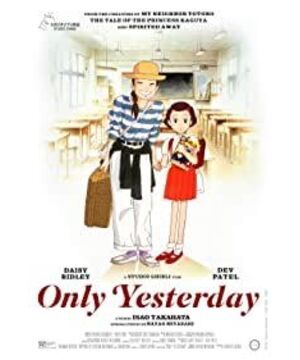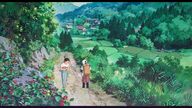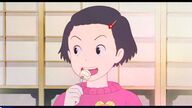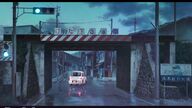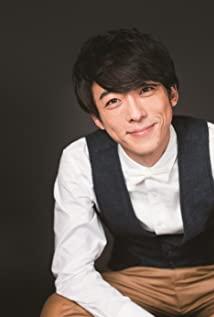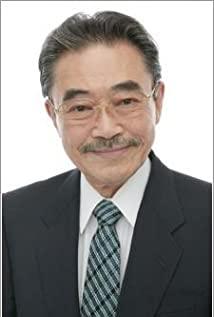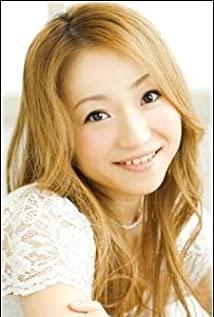The green hills under the Qinglan always remind me of the painting style of elementary school textbooks
So we strive to move forward, but like a boat against the current, we are constantly pushed back to the past.
Compared with "The Fairy Tale of the Years", I personally feel that another translation of it is more appropriate - "The Little Bits of Childhood". The first is that most of the films are inextricable from the popular understanding of "fairy tale style". It can even be said that most of the films present a unique look and feel about reality or memories of real life.
It is first shown in the many memories of daily life shown in the film: the overall outline of primary school life is full of positive and childishness, various distinctive and ubiquitous "student faces", the laughter and pain of getting along with family members and even Small things like exchanging food with classmates to solve ginseng food, insisting on physical education class because of avoiding menstrual period.
Although countries and times are different, children have many traits in common. Therefore, the vague familiarity of primary and secondary school life in the film gives the viewer many opportunities to gain new understanding and feelings. However, the plots that touched me are too numerous to enumerate. Here, I might as well be a sub-diode and give the two most impressive and opposite types of clips. The first thing I have to mention is the old things under the sunset alley. The ambiguous warm oblique light is full of the shy ambiguousness of the green pheasants. A stumbling and concise conversation:
"Rainy, sunny or cloudy, which one do you prefer?"
"cloudy day."
"Me too."
It leaves behind some of the most memorable shots in the film. And then the exaggerated flying to the sky is a magic touch to show the child's mood vividly.
Another not-so-good memory is when Taeko was stinged by her mother's second sister because of her poor math grades. This kind of pain may be experienced by every child more or less, and the hurt caused by family members is the most unforgettable. What's interesting is that Taeko's family members in the film don't seem to be very likable - the cold and authoritative father and the hurtful second sister. It is this incomplete sense of reality that destroys the fairy tale atmosphere of the film.
Another aspect of reality is in the way the memories emerge and their unadorned, silent endings.
All kinds of memories jumped out one after another along with Taeko Okajima's current experience, and they disappeared without a sound. The way this stream of consciousness is presented is exactly what we feel in real life - after some accidental and irrelevant things happen, we will be unreasonably associated with the past of distant years. But memories are only a few words left in the sea of time after all, not like a story that has a beginning and an end, and many of the endings of the characters in the memory eventually become suspense that has no trace and no longer cares.
As the protagonist says to himself:
"We seem to be ready to take off. But now that I think about it, we may just be stuck in a stage where we are desperately flapping our wings. The memories of fifth grade lingering in my head are not telling me that I want me to look back again. , spread your wings and fly again..."
For a sensitive and meticulous person like Taeko, the past is always haunting him. But at the end of the film, Taeko finally completed the so-called transformation and bravely made his own choice. I think the word "fairy tale" in the translation is the best proof here . The end of the fairy tale is always "so the hero and heroine live happily together."
The film also avoids exploring deeper potential contradictions and ends this warm fairy tale with a blank space.
View more about Only Yesterday reviews


